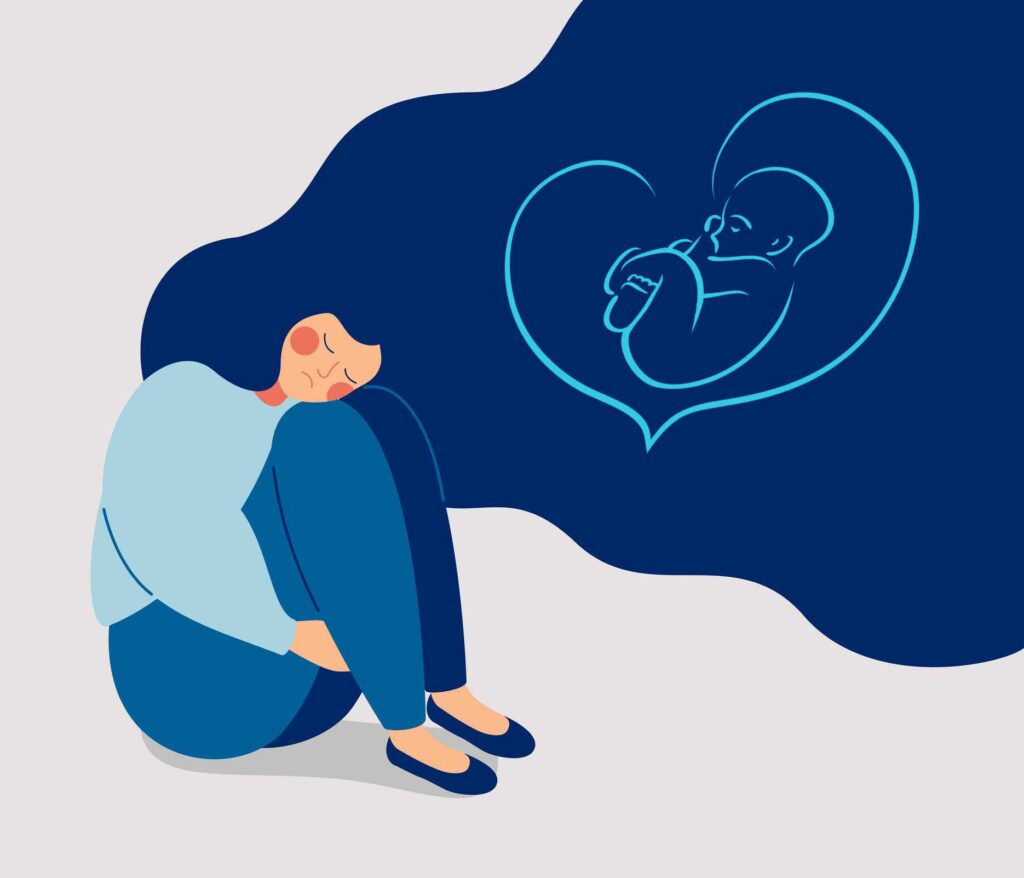Miscarriage is one of the most heartbreaking experiences a woman can go through. Not only do you have to cope with the physical pain and bleeding, but you also have to deal with the emotional pain that comes along with it. Miscarriage depression can be very difficult to cope with, but it is important to seek help if you are feeling overwhelmed. In this blog post, we will discuss some of the ways that you can cope with miscarriage depression.
Contents
Defining Miscarriage Depression
 Miscarriage Depression means different things to different people. For some women, it’s a temporary case of the blues that lasts a few days or weeks. For others, it’s a more serious, long-lasting form of depression that can interfere with daily life.
Miscarriage Depression means different things to different people. For some women, it’s a temporary case of the blues that lasts a few days or weeks. For others, it’s a more serious, long-lasting form of depression that can interfere with daily life.
There is no one “right” way to feel after a miscarriage. Some women feel relief, especially if the pregnancy was unwanted or if they were having difficulty carrying the baby to term. Other women may feel guilty, even though they know that a miscarriage is not their fault.
Miscarriage is a type of pregnancy loss that happens before the 20th week of gestation. About 15-20% of known pregnancies end in miscarriage, making it one of the most common types of pregnancy loss. While many women who miscarry go on to have healthy pregnancies, some women experience what is known as “miscarriage depression.”
Symptoms Of Depression After Miscarriage
A miscarriage can be devastating, especially if you felt a strong connection to the baby. You might feel sad, confused, and even guilty after miscarrying. These emotions are all normal.
Some women feel so down that they become depressed. Depression, which is medically referred to as major depressive disorder, is a mental illness where sorrowful feelings last for long periods. Some common symptoms women can face with miscarriage depression:
- Feeling numb or disconnected from the world
- Lack of interest in favorite activities
- Loss of appetite or eating too much
- Sleeping too little or too much
- Difficulty concentrating
- Feeling hopeless, guilty, or worthless
- Thoughts of suicide or death
If you are facing any of these symptoms, talking to your doctor is important. Depression is treatable, and there are many resources available to help you cope with your loss. You should also consider talking to a therapist or joining a support group. Don’t suffer in silence—get the help you need to feel better.
Miscarriage can also lead to anxiety disorders. Women who miscarry might start to feel anxious about their ability to have a healthy pregnancy in the future. This anxiety can become so overwhelming that it interferes with daily life.
How Does A Miscarriage Affect You Emotionally?
 The emotional effects of a miscarriage can be quite long-lasting. It is not uncommon for women to experience depression, anxiety, and grief for many months or even years after miscarrying.
The emotional effects of a miscarriage can be quite long-lasting. It is not uncommon for women to experience depression, anxiety, and grief for many months or even years after miscarrying.
Women commonly experience an array of feelings after miscarrying, such as sadness, guilt, anger, and depression. Even if the pregnancy is terminated early on, the bond between a mother and child can be powerful.
A miscarriage often comes with a range of intense emotions. Some women may also feel guilty or ashamed. Many times a woman starts to question their self-worth after miscarrying. Additionally, some experience postpartum depression following a miscarriage.
It is perfectly normal to experience all of these emotions after miscarrying. In severe conditions, you may find it helpful to talk to a therapist or counselor who can help you process your feelings.
If you have experienced a miscarriage, know that you are not alone in feeling depressed, anxious, or grieving. Many women go through this experience and come out stronger on the other side. With time and self-care, you will heal.
How A Woman Can Cope With Miscarriage Depression?
Women can cope with depression in many ways. Some women may seek comfort in their friends or family, some may find support groups helpful, and others may choose to see a counselor or therapist. There is no wrong way to cope with depression, as long as the woman is taking care of herself emotionally and mentally. However, there are a few tips that can help a woman to cope with this:
Identify your triggers
Women need to allow themselves to feel whatever they are feeling, as suppressing emotions can lead to further mental health issues down the road. Identifying triggers is an essential part of coping with depression. A trigger is anything that sets off a negative emotion. Once you know what your triggers are, you can avoid them or be prepared for how to deal with them when they do occur.
Talk about your feelings
It is important to talk about your feelings after miscarrying, talking openly and honestly about what you are feeling can help you to process your emotions. It is remembered that depression will take time to heal. Just as physical wounds need time to close and heal, so too do emotional ones. Give yourself the time and space you need to grieve in whatever way works best for you.
Challenge your Thoughts
Once a woman has identified her feelings, she needs to find a way to express them. This can be done through writing or participating in art or music. Women need to express their emotions healthily, as bottling them up can lead to further mental health issues.
Taking care of yourself
Women need to take care of themselves physically and emotionally after miscarrying. Depression can take time to heal. Taking care of yourself will help your body heal from the physical trauma of miscarrying and will help your mind cope with the emotional pain. This includes:
- Eating a balanced diet: Eating a healthy diet will help your body to heal and will give you the energy you need to cope with depression.
- Exercising: Exercise releases endorphins, which have mood-boosting properties.
- Getting enough sleep: Sleep gives your body time to heal and allows your mind to process your emotions.
- Meditating or practicing yoga: Meditation and yoga can help to calm your mind and body.
If you are struggling to cope with depression, please seek professional help. Depression is a serious condition that can be treated by a mental health professional.
Seeking Professional help
If you find that you are struggling to cope with your emotions or you are having difficulty functioning in your day-to-day life, seek professional help. A counselor or therapist can help you work through your emotions and develop healthy coping mechanisms.
A miscarriage can be extremely traumatic, and it might take a long time to recover emotionally. Both mothers and fathers frequently require therapy in cases of depression. The following are some of the most popular treatments for depression:
- Medications: Antidepressants are often prescribed to help people with depression. These medications can help to improve mood, appetite, and sleep.
- Therapy: Cognitive behavioral therapy (CBT) is a type of therapy that can be effective in treating depression. CBT focuses on changing negative thought patterns and behaviors.
- Electroconvulsive therapy (ECT): ECT is a treatment that is typically used as a last resort for people with severe depression. ECT involves passing electrical currents through the brain to induce seizures.
- Support groups: Joining a support group can be beneficial for both mothers and fathers who are struggling with depression after a miscarriage. Support groups provide an opportunity to share your thoughts and emotions.
No woman should have to suffer from depression after miscarrying. There are many resources available to women who need help with miscarriage depression. If you or someone you know is struggling with depression after miscarrying, please reach out for help.
Conclusion
Miscarriage depression is a type of clinical depression that can occur after a woman experiences a pregnancy loss. While grief and sadness are normal emotions to feel after miscarrying, some women experience a more severe, long-lasting form of depression.
If you are struggling to cope with your emotions or you are having difficulty functioning in your day-to-day life, seek professional help.
For further information and suggestions, please contact Therapy Mantra. We have a team of expert therapists that can help you overcome this problem. Get in touch with us right away to learn more about our services. You may also make an online therapy session or download our free Android or iOS app.


